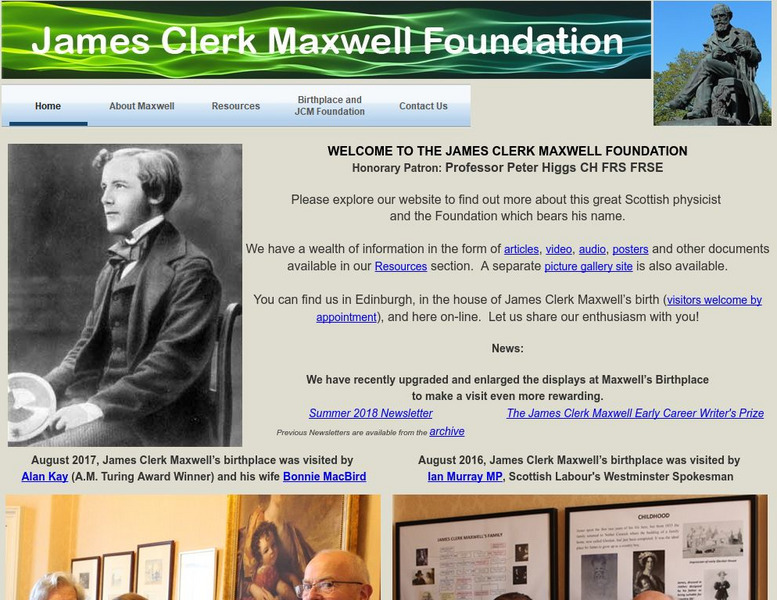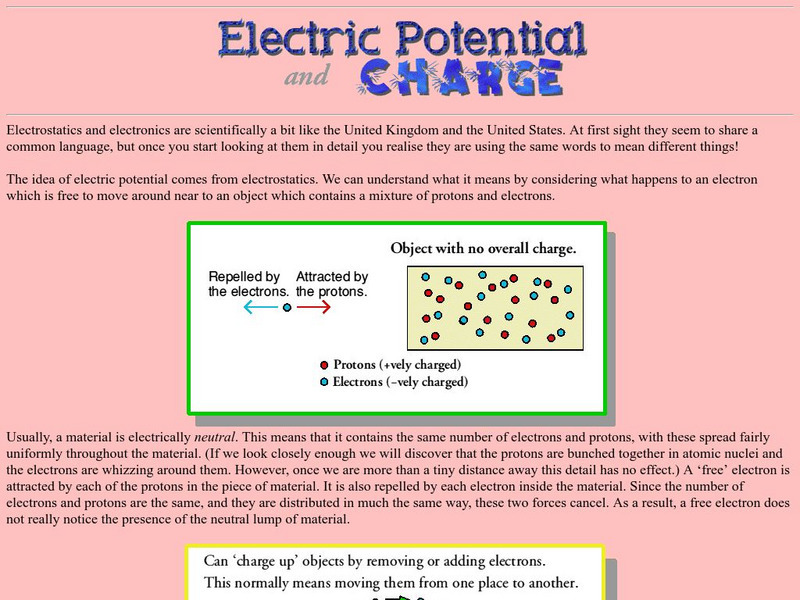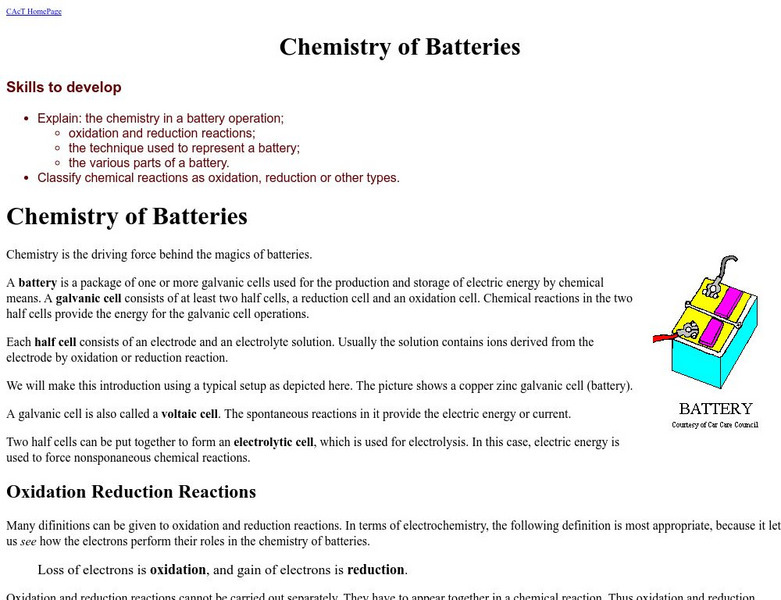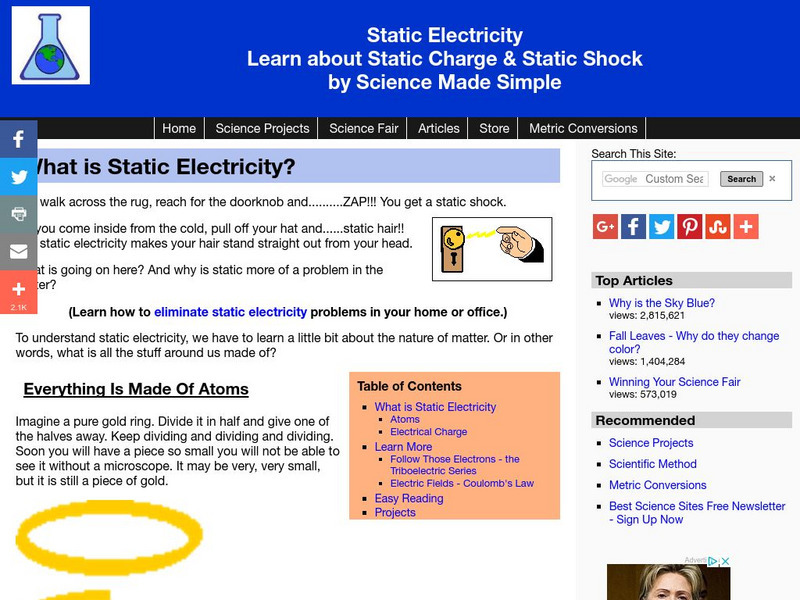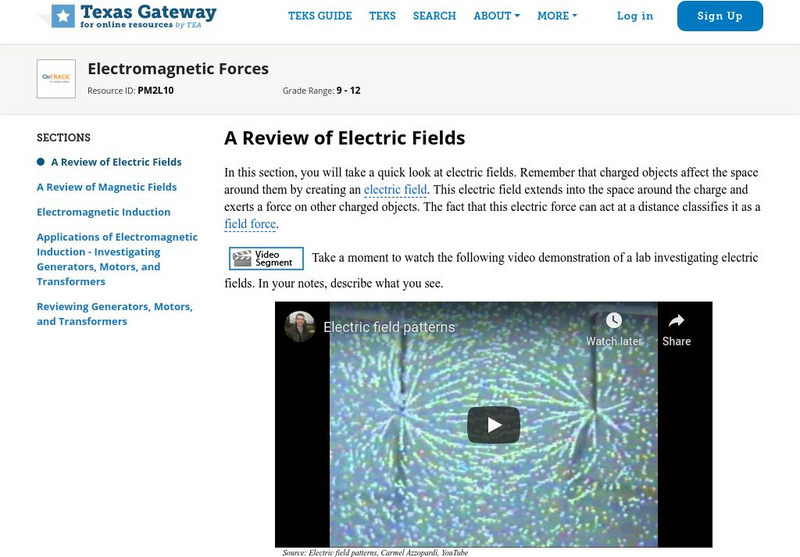Museum of Science
The Atom's Family: Electrical Safety
Help Frankenstein find out about electrical safety by clicking on the haunted house characters to find out what they are doing wrong.
University of St. Andrews (UK)
University of St. Andrews: Insulators
The nature of insulators is described at the atomic level. Band gap theory is used to explain what distinguishes insulators from conductors.
Other
The James Clerk Maxwell Foundation
The home page of the The James Clerk Maxwell Foundation, a charitable foundation to commemorate the life and work of James Clerk Maxwell. View Maxwell's house and read about the personal life of this notable scientist.
University of St. Andrews (UK)
University of St. Andrews: Physics and Astronomy: Electric Potential and Charge
From The Scots Guide to Electronics web site. The meaning of electric potential is described. A combination of diagrams and words are used to explain this difficult concept without the use of mathematics. Very well done!
University of Waterloo (Canada)
Computer Assisted Chem. Tutorial/chemistry of Batteries
A superb explanation of how a battery works. Discusses the associated chemistry which explains how a battery produces a voltage. Includes a series of "Confidence Building Questions."
National High Magnetic Field Laboratory
Magnet Academy: Wheatstone Bridge
This circuit is most commonly used to determine the value of an unknown resistance to an electrical current.
Smithsonian Institution
Lemelson Center: Invention of the Electric Guitar: The Guitars
In this online exhibition, learn about the evolution of the electric guitar by browsing dozens of influential guitar models. Through diagrams and audio samples, discover how different types of electric guitars work and sound.
Soft Schools
Soft Schools: Static Electricity Quiz
Take an interactive, multiple choice quiz over static electricity. After completing the quiz, check your score, and then revisit any incorrect question for further review.
Science Made Simple
Science Made Simple: Static Electricity
This website has three different projects from which to choose on the topic of static electricity. Scroll up to learn more about static electricity.
E-learning for Kids
E Learning for Kids: Science: Greece: What Can Electricity Do?
Alex is an actor in a play. Help him figure out which items use electricity so he can make sure everything is ready for the play.
Texas Education Agency
Texas Gateway: Electromagnetic Forces
Given schematic diagrams, illustrations or descriptions, students will identify the relationship of electric and magnetic fields in applications such as generators, motors, and transformers.
Physics Aviary
Physics Aviary: Simple Circuit Lab
This lab is designed to have students investigate the relationships between voltage, resistance and current in a circuit with only one passive component. The batteries in this simulation can be varied from ideal batteries to batteries...
Physics Aviary
Physics Aviary: Series Circuit Lab
This lab is designed to have students investigate the relationships between voltage, resistance and current in a series circuit with up to three passive components. The batteries in this simulation can be varied from ideal batteries to...
Physics Aviary
Physics Aviary: Magnetic Induction Lab
This lab was designed to have students test the things that can induce a current in a coil of wires. This lab is a purely quantitative lab.
Physics Aviary
Physics Aviary: Induced Current Lab
This lab was designed to have students test the factors that determine how much current is induced in a circuit when area of the circuit is changed. This lab is a quantitive lab that supplements the lab on magnetic flux.
Science Struck
Science Struck: The 13 Types of Energy and Their Applications
Read about all the different kinds of potential and kinetic energy. Includes energy formulas and examples of energy applications.
TED Talks
Ted: Ted Ed: How Do Fish Make Electricity?
How do fish produce electricity? Eleanor Nelsen illuminates the science behind electric fish.
University of St. Andrews (UK)
University of St. Andrews: James Clerk Maxwell
Research resources for James Maxwell (1831-1879), who did revolutionary work on electricity and magnetism and on the kinetic theory of gases.
University of St. Andrews (UK)
University of St. Andrews: A Visit to James Clerk Maxwell's House
From the MacTutor History of Mathematics website, this page allows students to see the Edinburgh home of the 19th century Scottish physicist James Clerk Maxwell.
Concord Consortium
Concord Consortium: How Electrons Move
Being able to control the movement of electrons is fundamental for making all electronic devices work. Discover how electric and magnetic fields can be used to move electrons around. Begin by exploring the relationship between electric...
Concord Consortium
Concord Consortium: Target Game
Steer a charged particle to a target, and observe forces and fields.
Khan Academy
Khan Academy: Conservation of Charge Review
Review the conservation of charge and how charge is transferred in various scenarios.
Khan Academy
Khan Academy: Current, Resistance, and Resistivity Review
Review the key terms, equations, and skills related to current, resistance, and resistivity, including how to find the current direction and what resistance depends on.




